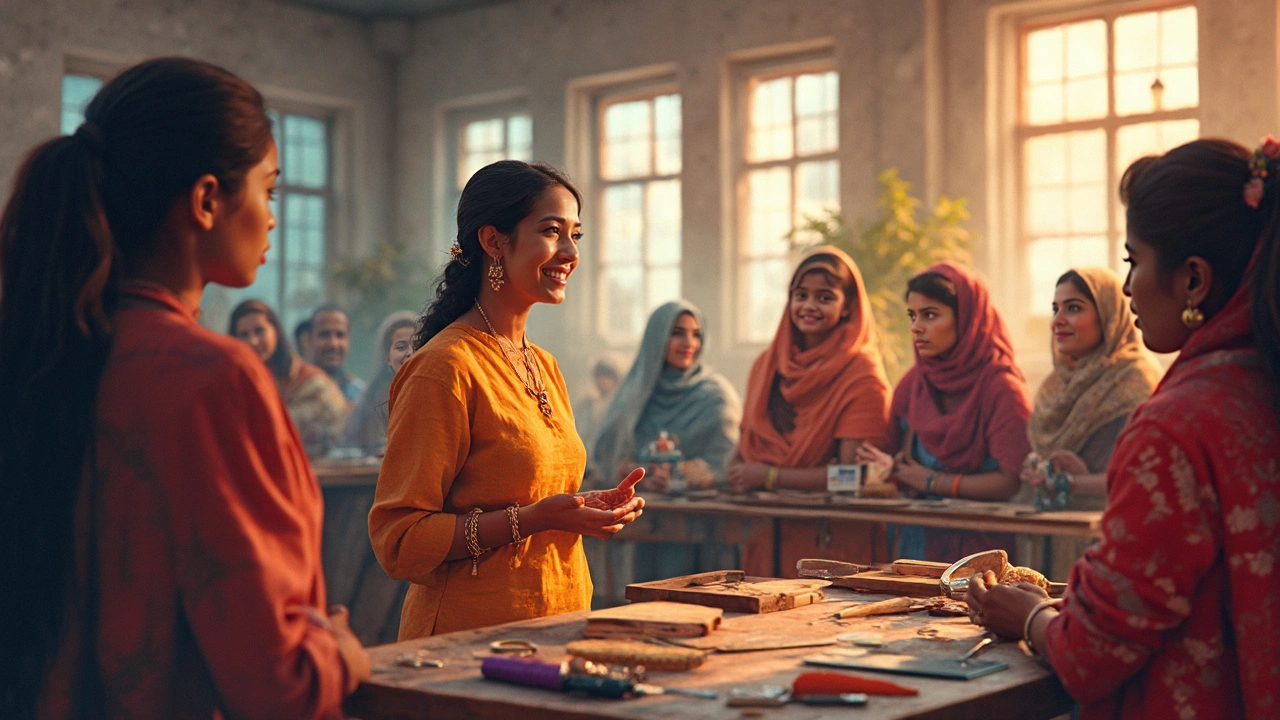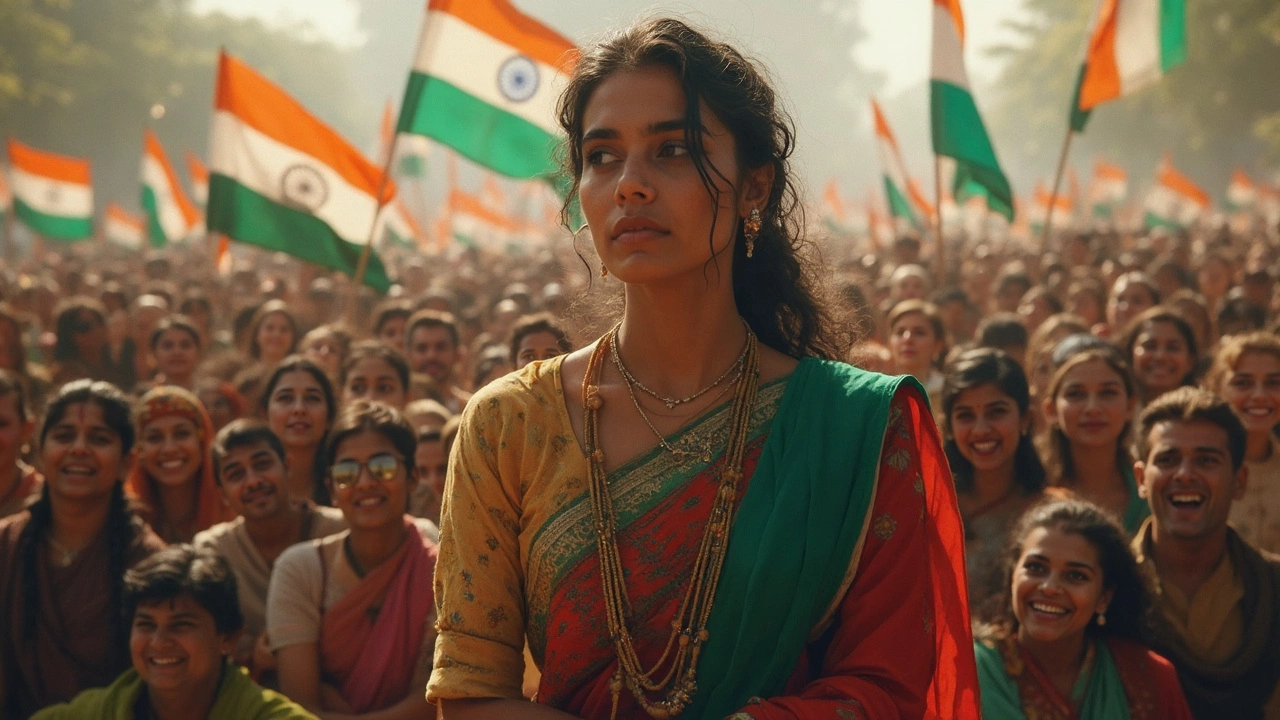
Ever wondered about who packs the biggest punch in the world of female activism? Well, when it comes to shaping vocational training for women, one name that often pops up is Malala Yousafzai. She's not just famous, she's a game-changer. Malala's known for her fearless stand for girls' education even in the face of grave challenges.
You might remember Malala for surviving a terrifying attack by the Taliban at just fifteen. Crazy, right? Yet, instead of backing down, she turned the experience into a powerful campaign for education. The world noticed. Illuminating stories like Malala's challenge not just oppressive regimes but open doors for countless women seeking skills and training across the globe.
Her advocacy doesn't just stop at education. It ripples through vocational training too. Why? Because skills mean empowerment. With her influence, Malala has encouraged more opportunities for women to gain practical skills, leading to better jobs and self-sufficiency. That's how change happens—one courageous stand at a time.
- Introducing the Icon: Malala Yousafzai
- Her Early Life and Challenges
- Brave Steps Towards Change
- The Impact on Vocational Training
- Her Continued Influence Today
- Lessons Learned from Her Journey
Introducing the Icon: Malala Yousafzai
Malala Yousafzai is a name that echoes around the globe when it comes to women's rights and education. Born on July 12, 1997, in Mingora, Pakistan, she's the youngest ever Nobel Prize laureate. Her journey from the Swat Valley to being a global icon is nothing short of phenomenal.
Malala's bold voice first gained international attention when she started blogging for BBC Urdu under a pseudonym at just eleven. She wrote about life under the Taliban, who were banning girls' education in her area. Those blogs were a window into a world many were unaware of, and they sparked global conversations about gender equality.
On October 9, 2012, Malala's life took a dramatic turn. While riding home on a school bus, she was shot in the head by a Taliban gunman. This violent act intended to silence her instead amplified her voice. Following her recovery in the UK, she didn't back away. Instead, she stood even stronger for girls' education and against oppression.
Malala cofounded the Malala Fund, which supports education programs for female activists around the world. Today, this fund actively works in several countries to ensure that girls receive 12 years of free, safe, and quality schooling. She continues to inspire by speaking at the United Nations, meeting with world leaders, and encouraging grassroots activism.
Her impact goes beyond advocacy. In a world where education defines futures, Malala highlights the significance of vocational training too, recognizing that skills equip women to change their story. Her efforts illustrate that the power of one voice, when persistent enough, can lead to real, tangible change.
Her Early Life and Challenges
So, where did it all begin for Malala Yousafzai, this iconic female activist? Born on July 12, 1997, in the Swat Valley of Pakistan, Malala grew up in a pretty unique household. Her dad, Ziauddin Yousafzai, ran a girls' school there and was super supportive of women's education, which wasn't the norm in their community at the time. This set the stage for Malala's early passion for learning.
But, growing up in this picturesque valley wasn’t all sunshine and roses. The Swat region was fine until around 2007, when the Taliban started to take control. These guys weren’t big fans of girls’ education, to say the least. They began closing schools and even destroyed over 150 of them by 2009! Malala, just a kid at that time, was witnessing an auction on her and her friends’ future.
At the tender age of 11, Malala decided to speak out. She started writing a blog under a pseudonym for the BBC, sharing her experiences and thoughts about life under Taliban rule. Sounds like a lot for a kid, right? All she wanted was to learn in peace. But by doing that, she was putting herself on a path that would later inspire people globally.
Despite the evident dangers, Malala's family was always by her side. Her dad not only supported her educational ambitions but stood firm against the Taliban’s oppressive tactics, and that bravery rubbed off on Malala. But as history tells us, standing up to tyrants is no walk in the park. In 2012, at the age of 15, Malala’s outspoken activism led to her being targeted and attacked by the Taliban while riding her school bus. The world watched in horror but also admiration when she survived and continued to amplify her voice even louder.
Brave Steps Towards Change
Malala's journey of becoming the most famous female activist wasn't a walk in the park. It all took a pivotal turn on that fateful October day in 2012. The world was shocked when a Taliban gunman attempted to silence her. But Malala wasn't having it. At just 15, she became a global symbol of defiance and hope.
She took her first brave step towards change at the age of 11 by blogging under a pseudonym for the BBC, highlighting the struggles she and other girls faced trying to get an education under Taliban rule in Pakistan. Can you imagine having the guts to do that at such a young age?
After surviving the attack, Malala didn't go into hiding. Nope. Instead, she did the opposite. She continued her fight on a much bigger stage. In 2013, she delivered an awe-inspiring speech at the United Nations, advocating for children's rights and access to education. This speech wasn't just an average talk—it was a game-changer. It reinvigorated global conversations about education and inspired reforms in various educational policies worldwide.
With the help of the Malala Fund, which she co-founded, millions of dollars have been poured into local education programs, especially for girls and young women. It's not just talk; it's action—a direct push towards better vocational training opportunities.
These brave steps didn't just make headlines; they've laid down practical groundwork for tangible change. By 2017, the Malala Fund had supported educational projects in six countries and pushed major governments to invest more in education. Malala’s daring journey transformed her story from one of personal survival to an influential movement that continues to reshape the future of education for girls worldwide.

The Impact on Vocational Training
When you're talking about creating opportunities, vocational training stands as a pillar of empowerment, especially for women. Malala Yousafzai's influence stretches far beyond the classrooms. Her advocacy has spotlighted how crucial it is for women to acquire practical skills that can lead to financial independence.
Now, you might ask, what's the big deal with vocational training anyway? Well, for many women around the globe, it's a ticket to a better life. It means getting skilled in trades like sewing, IT, teaching, or healthcare—areas that need skilled hands and minds. It's not just about earning a livelihood but also about societal shifts where women contribute equally to the economy.
Take a look at initiatives like the Malala Fund, which allocates resources not just for traditional education but also for skill development. They're all about supporting initiatives that ensure women are equipped to step into modern economies with confidence.
Here's a quick peek into some stats that underline the importance of what we're discussing.
| Country | Women Enrolled in Vocational Training (%) |
|---|---|
| Bangladesh | 45% |
| Pakistan | 38% |
| India | 51% |
These numbers reflect how significant the shift is becoming, especially in regions where women traditionally hadn't accessed such opportunities. What Malala and similar activists are doing is not just advocating in speeches. It's tangible change—more women trained, more women employed, and more families uplifted.
Malala's work stresses the right for women to not only step into classrooms but to walk into any career path they choose, equipped with the necessary skills. It's not just about theory—it's about action, influence, and real change.
Her Continued Influence Today
These days, Malala Yousafzai isn't just resting on her laurels. Her hands are full with projects that keep turning heads and changing lives. The Malala Fund, which she founded, is a prime example of how she's leveraging her fame for good. It's all about ensuring girls, everywhere, have access to 12 years of free, safe, and quality education. Talk about making waves!
The fund does more than just talk the talk—it funds local educators and activators, helping even the toughest regions gain schooling access. And yeah, this extends to vocational training as well. It's not just about hitting the books; it's about building skills that translate to real-world jobs. This is crucial in places where traditional schooling isn’t an option for girls.
Malala’s work also provides a megaphone for those often silenced. She's a regular at international forums, from the United Nations to major global events, pushing agendas around women's rights and vocational training. It’s funny, right? How one person can create pathways for so many others? But that’s Malala for you.
In case you're wondering how her influence reaches those who need it most, here's a recent snapshot:
| Region | Number of Projects Funded | Youth Impacted |
|---|---|---|
| Afghanistan | 35 | 120,000 |
| Pakistan | 50 | 200,000 |
| Nigeria | 40 | 150,000 |
Data like this shows her work's depth. The Malala Fund isn’t just a flash in the pan but a long-term commitment to shaping futures. After all, empowering women with education isn’t a one-time task. It's a continuous endeavor, and with Malala at the helm, it’s one that's definitely heading in the right direction.
Lessons Learned from Her Journey
Malala Yousafzai's journey has so much to offer when it comes to understanding what drives change. She's shown us that even when the odds are stacked against you, a strong conviction can make all the difference. One key takeaway? Don't underestimate the power of education.
By boldly advocating for girls' education, she highlighted how important it is for women to have access to learning. It's not just about reading and writing; it's about giving women the tools they need to thrive. This push for education naturally spills over into the realm of vocational training for women, showing how these skills open up opportunities.
Women's rights often face stiff resistance, but Malala teaches us that perseverance matters. She faced intense challenges, yet her courage has inspired countless women worldwide to pursue their dreams, no matter the barriers. Her story encourages women to not step back but to step up, channeling challenges into action.
Malala also shows the world that activism doesn't have to be a solo act. Her journey emphasizes the importance of global support and community. She's rallied people of different backgrounds to come together for a shared cause. This collaborative spirit is crucial when pushing for changes like increased access to vocational training.
Finally, understanding that small actions can lead to massive ripples is a crucial lesson. Malala's initial drive to attend school led to a movement that has inspired young women everywhere—proof that even a single voice can be powerful.
So, if there's a lesson here, it's to stay determined, work together, and believe in the cause. With the right mix of grit and support, significant changes in fields like vocational training for women are not just possible—they're inevitable.
